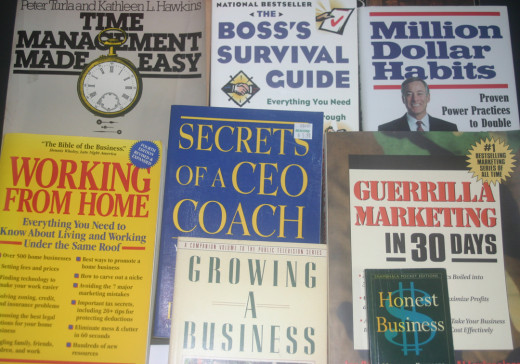Time Management Skills for the Small Business Owner
Solo Business and Small Business
A solo business is the smallest small business - a one-man (or one-woman) band with no employees. A small business could have 5 or even 50 employees. Some of these tips are only for the solo professional. Almost all of them will actually work for any business owner.
Too busy!

Never Enough Time, and Worse
The solopreneur, the owner of a one-person business, seems never to have enough time to get everything done. At best, we are on a cycle of boom-and-bust. When we have a lot of work, we have no time for marketing our business. Then we run out of customers, and can't afford the marketing we need.
The worst feeling I've ever encountered is burnout. I became a solopreneur because I love what I do - learning, teaching, writing, training, consulting. When I got burned out, I started to hate doing what I love to do - and that is the worst feeling in the world!
But I didn't give up. Instead, I learned good methods for time management, managing my time, reducing my stress, and increasing my productivity. That brought joy back into my life, and success to my business.
Without good time management, at worst, we have no time for our business and our life combined. Either our marriages and families suffer, or we take care of them, and our business suffers.
If we don't break out of these cycles, the end is bad. At best we return, miserable, to the old 9-to-5. At worst, we may lose our family, or, with financial failure, find our home in foreclosure.
I like to start an article by describing directly how bad it can be. That allows me to talk honestly about how great it can be - and how it's up to you.
What is it like when the solo business professional solves his or her time management problems?
- We have so much work coming in that we get to turn away bad jobs, and only work for the best clients at the highest rate.
- We feel tremendous. We are doing what we love to do and we love doing it.
- We make more money than we need. That gives us freedom, either to save and invest, or to enjoy some extras, or to work less and share more time with family and loved ones, or doing enjoyable things.
- We have a whole, balanced life. We are financially well off - much better than we could be in a job - and we also enjoy time with family and friends.
Imagine that solution - and read on to learn how you can make it happen. It's up to you: and you can do it!
How Free-Wheeling Are You?
Some of us like to manage our time in a very structured way. Others keep it loose. Neither is right or wrong. Which works for you?
Table of Contents
- Manage Time, Stress, and Quality of Life
Low-stress work is effective. A low-stress life is enjoyable. Don't just manage time: Reduce stress! - Separate Work and Personal Time
Work at work. Play at home. - Uninterruptible Work Time
When we know we won't be interrupted, we get three times as much work done. - Planning and Action
Success is the result of making great plans and putting them into action. - Production and Project
Separate ongoing, repeating production work from one time improvements done in projects. - Effective Delegation
Make sure that the people who work for you do great work and take very little of your time. - Now: Put it All Together
Make this real every week and every day. And if you slip, that's okay: You can always make a fresh start!
Working Less and Achieving More
Over ten years ago, when I hit my point of complete burnout, I read an article that said that people who work over 55 hours a week are no more productive than those who work 40 to 55 hours. At first, I thought that was bad news. I was working 70 hours a week. That meant that I was doing an extra 15 hours a week, and all for nothing. Boy, was I pissed!
Then I saw the upside. I was incredulous: You mean I can work 15 hours less each week and get just as much done?
I moved slowly and deliberately in that direction. First, I committed to stopping work at 5pm every Friday, even if I had to work on the weekend. Then I reclaimed my Saturday. At that point, I began to feel well-rested. My head cleared. I made better decisions. I frittered away less time with busy work.
Soon, I found myself working a 5 1/2 day week, and making four times as much money as I had made before. I was healthier and more relaxed, too.
Manage Time, Stress, and Quality of Life
Whenever I hire an administrative assistant, I tell them that my stress free work time is the company's most important asset. Therefore, an assistant's job is to reduce my stress and free up my time.
Quality time is a huge buzzword, but it has real meaning. As solopreneurs, we are our own business's most crucial asset. More specifically, our time at our best is our biggest asset. Businesses succeed by managing and leveraging key assets. Therefore, the first step in time management is to discover, then increase, the amount of time we are on our game, at work, doing our best, making the best decisions and doing the best work.
And the same applies to our time away from work, too. The more quality time we bring to family, and the more quality thinking and work we devote to solving everyday problems, the less interruptions, hassles, and energy drains we will experience at work.
Let's take a look at how to maximize our stress-free work time. This article focuses on time management techniques. Stress management techniques are important too, so be sure to take a look at Solopreneur: Stress Management for the Solo Business Professional, too.
Not What I Recommend!

Separate Personal and Professional Time
Our first step is, as much as possible, to separate the time invested in our business from the time invested in our other roles. Note that I use the word invest, not spend. I don't spend time. Everything I do adds to the success of my business or the joy of my life. Therefore, my time is something I invest, not something I spend or waste.
Know All Your Roles
The first thing we need to do is define all our roles. It is not enough to say "I have work, and I have my home life." We must be more specific. For example:
- I am a business owner.
- I am a husband or wife or boyfriend or girlfriend.
- I am a householder and perhaps a gardener: I take care of my home or apartment.
- I am a mother or father.
- I am a son/daughter, brother/sister, relative.
- I participate in some religious or spiritual activities.
- I enjoy these hobbies, sports, arts.
Include things you want to do. And include things you are doing now and want to stop doing. You may invest just two to five hours a week in some of these roles, but you still have to include them to make your life work.
If you don't want the rest of your life to creep up and take away your work time, it is essential to know all your roles, and make time for it all.
Create Distinctive Breaks
If you work from home, don't just slip into your office in your bathrobe. Get dressed for work. Then walk out the door, walk around the block, come back in, and go straight to your office. I'm not kidding! This works. It creates a mental separation that is essential to success. And do the same at the end of the day. Walk out the door, walk around the block, and come in and say, "Honey, I'm home!"
Use the same idea for shorter breaks. If you get a personal phone call at work, take care of it. And, when it's over, take a three minute stretch break. Then dive back into work with your full attention.
Close Doors, Pull Curtains, and Demand Separation
We need to ask for, and, if necessary, insist on, respect and support for our work. I had an assistant who worked from home. She couldn't close the door to her office, but she could put up a sign that said at work. Her two sons, age 8 and 10, were old enough to know not to bother Mom at work unless it was really important. They had a discussion about what was really important, and the kids learned to respect her "at work" sign. She got a lot more done.
Then her husband's hours shifted, and he was at home more during the day. Unfortunately, he had a hard time learning to respect her "at work" sign, and kind of thought he could interrupt whenever he wanted or needed anything. Sometimes, it's the grown-ups who have the hardest time growing up.
In that case, stick to your guns. The life of your business depends on it.
When Personal Life Breaks Into Your Business
Since life is messy, things will go wrong. There will be personal intrusions at work.
When they happen, give them your full attention, one hundred percent. Then finish as soon as you can. Take one of your short refresher breaks, and get back to work, one hundred percent.
Make a note of all these interruptions. At the end of the week, evaluate them. Some of them, like a call from school that your child is sick, can't be changed. Others, like a friend or family member calling up to ask for a little help; that you can change, or at least try to. Make a time to sit down with that friend or family member and teach them the rules of the road. Say, "Even if I work for myself, I still have to work. In fact, it's even more critical now. When I got a corporate paycheck, I could slip in a call now and then. Now, my focus on my work needs to be total. I like you, and I will help you out. But if I tell you I don't have time to talk right now, I mean it. Please do respect that.
Uninterruptible Work Time
The goal of separating work time from everything else is to create uninterruptible work time. This is not just time when you are not interrupted, it's time when you know that, except for emergencies, you will not be interrupted. You can count on getting focused, making great decisions, and getting a lot of work done.
Uninterruptible work time feels great. More than that, it is proven to be three times more productive than interruptible work time.
Think about that. You could finish your 60-hour work week in 20 hours, if your work time was uninterruptible. That's worth shooting for.
When we have uninterruptible work time, we make our best decisions, do our best work, and deliver our greatest results.
Planning and Action
Once we have uninterruptible work time, let's use it to create success.
Success comes down to two things: Make great decisions, then implement those decisions through excellent work.
Great Decisions
Great decisions take time and attention, and also follow a good process. Sometimes, they can't be made in a single meeting. In fact, recent scientific evidence shows that the idea of sleeping on an important decision is true. During sleep, we look at problems from different perspectives. Whether we dream about the problem or not, we often wake up with better ideas about what to do.
Here is an overview of good decision process:
- Define the problem clearly. Be clear about the consequences of doing nothing, and letting the problem continue.
- Get any expertise you need.
- Come up with at least three solutions. If you say "there are no options," or "this is the only thing we can do," or "we have to do one or the other," then you are caught in that box everyone is always talking about, and it's time to think outside the box.
- Compare the up-sides (benefits) and the down-sides (risks and costs) of each option. And compare each option to the choice of doing nothing. Make an initial decision.
- Sleep on your decision.
- Re-evaluate and make a final decision.
- Put the final decision into action with clear plans and direct work.
Even though I wrote this in the language of problem-solving, it works equally well when deciding on whether to pursue an opportunity, or choosing between opportunities.
Excellent Work
Often, we just dive in and get to work. And that's good. But is it great? I encourage you to ask yourself how you do your best work. It's different for everyone, but, when you know your own secret sauce, you'll take your business to the top.
For example, writing as much as I do, it's pretty easy for me to write a good article. But what does it take to write a great article? That's harder. I have to be inspired. But I've learned a few things about how to inspire myself:
- I write the opening paragraph and outline in the evening, really quickly. Then I sleep on it, and wake up full of ideas.
- I look at, or create, photos and diagrams to go with my articles. They inspire me to share my picture of life with you.
- I think about what is happening in my life right now, and in the lives of those around me. I often find examples of what's happening that illustrate exactly what I want to say.
I've learned that we can do better than keep working, and hope inspiration happens. We can get to know our own work styles well enough to know how to get genuinely inspired and motivated - not false rah-rah, but real powerful work, whether it's writing or thinking or selling or anything else we do for a living.
Great planning and action is the real lynchpin of excellent time management - it is using our time to maximize our success.
Rolling in Your Roles
If you use everything you've read up to here, then you'll be on your game. Now, it's time to stay on your game. With or without doping, Lance Armstrong didn't win the Tour de France seven times in a row by biking one good leg of the race one day. He raced his best day in and day out, year in and year out. And we want to do the same.
Keep a to-do list for each role. Then block time for each role on your calendar. When it comes time to work in a particular role, open the to do list, do what's on it, and then move on to the next roll.
Here's an example. As I write this, it's Wednesday evening. I've written for a while, and it's time for a short break. I'll stop writing and jump to my householder roll. Wednesday night is garbage night. I'm off to take out the garbage. . . .
. . . there we go - garbage is out - and I've gotten a bit of fresh air and a stretch, too. And now I'm 100% back with you.
Do you see how all this ties together? Each thing I do, I do 100%, fulfilling the role it is a part of. And, as a result, each thing I do leaves me clear and sharp for the next activity. This is truly time management - managing the asset of my focused attention, one thing at a time, to preserve and use the asset for maximum profit. And its not just personal profit. Yes, I'm healthy and happy. And I share the results with you. And people are delighted to have me write for them and work for them.
Defining Your Business Roles
To take it the next step, we now want to break down your work time into business roles. There are times you:
- are doing work for customers
- are marketing
- are selling
- are managing finances
- are making executive decisions
and many more roles that, altogether, make a working business. Do the same with these roles as you did your personal roles. Block work time out for each one, make a to-do list for each one, and roll along!
Production and Project
As you make your to-do lists, you're going to discover something. Almost all tasks fall into one of two categories. Some tasks repeat; those are production tasks. They include: making bank deposits; paying quarterly taxes; following up sales leads. Other tasks are done just once, and are part of a project that leads to specific results.
This leads to two key rules for the solopreneur:
- Keep all your roles in production rolling; don't let things pile up. For example, don't fall into the trap of stopping marketing when you have a lot of client work.
- Do only one project at a time. Fix one broken process. Or follow up on one big opportunity. Do only one, new different thing at at time. And do it one hundred percent, and realize it's full value.
If we don't keep everything running in production, our business will never get off the ground. But if we try to fix everything at once, we'll become completely overwhelmed. But, if you follow those two rules: Keep everything running, then improve one thing, and another, and another, then everything will keep getting better, day by day.
By the end of a few months, you will see huge new successes.
Effective Delegation
Even though you run a one-person business, you probably don't do everything yourself. Most solopreneurs have tax accountants, consult lawyers as needed, and get help building their web sites. As we grow, we may want a bookkeeper or an administrative assistant, perhaps a virtual assistant. You might want help with marketing or sales.
Choose wisely. A good assistant helps you grow. One who is not effective, independent, and self-managed, or simply is not good at his or her work, will create problems that you will have to live with for a long time.
And, when you choose well, and they've demonstrated their ability, trust them by delegating more and more work.
One of the best assistants I've ever had was a college senior majoring in business. I chose him because he played football. I trust people who play sports or musical instruments when they are young; they are more likely to have inner discipline.When he first started, I could give him a small task. He would work for an hour, show me his work, and ask for something else. That was okay for a week. In the second week, I asked him if I could give him three tasks, and he could do them all, and then talk to me at lunch time. I got three uninterruptible hours of work done, and so did he.
Six months later, I could line him up with 15 hours of work (his entire work week), and work for 40 hours, and check in for just an hour or two a week. He coordinated work with me, producing all the images I needed for a book on statistics as I wrote it, and delivering excellent results on time.
He did his job so well that his last project for me, before he graduated college and went on to a successful career in banking, was to write the manual that all my assistants have used, ever since.
Find self-managed people who will grow with you, and have them help you grow your business.
Are You a Success Book Junkie?

Now: Put it All Together
Will you make use of the time you invested in reading this article?
One of my clients, before he met me, was a success-book junkie. He read every success book out there. But he wasn't a success. Why not? Simply this: He read the books, but he didn't use what he read.
Time management, ultimately, is managing what we do with our time. So, please take the quiz below. If you don't get a top score, then re-read this article. At that point, you are ready to get started: block out some time, make your lists of roles, both personal and on the job, and start some new habits.
Review Your Time Management Knowledge
view quiz statisticsEvery Week
At the end of each week, review your to-do lists, and bring them up to date. Plan ahead. Don't think, "What do I have to do?" Think, "What do I dream of doing? What can I do to make my business really grow?" Put some time in on each of those each week, and also do what you have to do to keep things rolling.
Every Day
Use your uninterruptible time. Dive into one role, and do the tasks on the to-do list, one hundred percent. Then move on to the next role, and do that one hundred percent. Include good time for self-care and fun.
A Final Thought
Keep it fun! Find ways to make your work fun. I can't tell you how - I like silence; but others like to bop along to music. But I do know this: If it's fun, you'll do it.
And when you do the work that needs to be done, your business will grow. Imagine that - enjoying your day as your business grows and your dreams become real.
I take that back! Don't just imagine it! Do it!
Make a Fresh Start!
It doesn't matter how many times you fail, as long as you remember this equation: Success: Number of times you make a fresh start = 1 + Number of times you fail.







